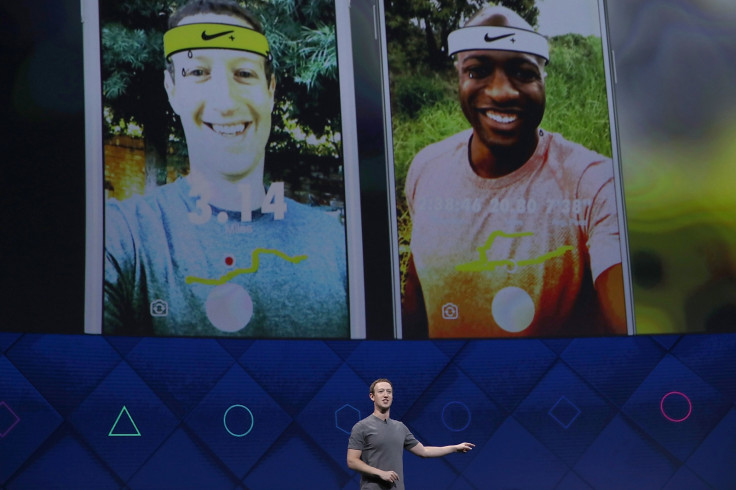Augment your reality: 5 key takeaways from Facebook's F8 developer conference
Facebook's biggest conference of the year showcases some of its new tools and initiatives in the works.

Facebook officially kicked off its annual F8 developer conference in San Jose, California, on Tuesday (18 April) with CEO Mark Zuckerberg delving into the company's augmented reality and virtual reality future. Hosting thousands of developers from around the world that work with Facebook, the company's biggest conference of the year showcases some of its new tools, features and initiatives in the works whilst offering a sneak-peek at some of its long-term plans for the future.
Donning his signature grey T-shirt and jeans, Zuckerberg began his keynote by addressing the recent gruesome Cleveland murder that was broadcast on Facebook on Sunday. He offered his condolences to the victim's family and said Facebook "will keep doing all we can to prevent tragedies like this from happening".
Following a couple of dad jokes and Fast and Furious movie references, Zuckerberg dived into Facebook's ambitious plans to "extend the physical world online" and intermix the digital and physical worlds in new ways to "make our physical lives better".
Here are the key takeaways from day 1 of Facebook's F8 conference:
Camera Effects platform
"If you're going to take one thing away from today, this is it," Zuckerberg announced. "We're making the camera the first augmented reality platform." While rolling out features such as filters for photos is "Act 1," the 32-year-old billionaire dubbed the new platform as "Act 2."
Zuckerberg outlined three main uses for AR - to display information such as arrows on streets for directions, to overlay digital objects to the real world similar to Pokemon Go and to enhance existing objects such as one's face or home.
Launching in beta on Tuesday, the new open-source "Camera Effects Platform" will allow developers to build and contribute new features and interactive experiences into Facebook's built-in Camera feature.
Zuckerberg showed off a number of features that could be created through the platform from tabletop games with 3D characters, leaving notes or placing art in real-world places for people to view through AR or having tiny digital sharks swimming around your bowl of cereal.
Zuckerberg said devs can use simultaneous localisation and mapping (SLAM), object recognition and depth detection to create some of these effects and experiences.
AR Studio and Frame Studio
Developers can now use two coding tools to create some of these features and experiences - AR Studio and Frame Studio. While AR Studio, currently in restricted in closed beta, lets developers create interactive 3D masks over human faces that track and respond to facial movement, Frame Studio lets devs create 2D overlays to adorn photos and videos.
Zuckerberg admitted that the technology is still in its nascent stage and will take time for these experiences to roll out.
"Some of these effects are going to be fun and others are going to be useful," Zuckerberg said. "Over time, I think this is going to be a really important technology that changes how we use our phones."
Facebook Spaces
Facebok has also launched a new social virtual reality world in beta called Facebook Spaces for the Oculus Rift that lets users design their own avatars and hang out with friends in the virtual location of their choice. The new platform marks the first time Facebook is linking its sprawling social network to the Rift in a major way since the company first bought Oculus for $3bn back in 2014.
"Done right, VR gives you a feeling of total immersion," Facebook's social VR chief Rachel Rubin Franklin said. "You actually feel like you're in the room with somebody. You forget you're avatars."
Messenger 2.0
One year after Facebook introduced automated chatbots on its Messenger platform, Messaging chief David Marcus unveiled what he called Messenger 2.0 along with a slew of new tools. To make Messenger easier to navigate, Facebook is adding a new dedicated Discover tab to browse various Messenger tools, bots, apps and brands as well as a separate tab for games.
Users will also be able to add a bot into a conversation through Chat Extensions. For example, people can share a song using Spotify, reserve tables via the chat using OpenTable or discuss group travel plans using Kayak.
Using the Messenger camera, users can also scan custom QR codes to launch a related brand's bot.
Facebook's own personal virtual assistant, M, will now begin chiming in with bot suggestions to serve a need that a user is discussing. For example, if you are chatting with your friend about ordering food, it could recommend delivery'com's bot to order some grub.
Powered by artificial intelligence, the new Smart Replies feature will allow small businesses with Facebook pages to automatically respond to common FAQs such as business hours and contact details.
"We think of Messenger as being like the new social living room for the world, where people can hang out, share, chat, play games or buy things, while still being able to reach nearly everyone, wherever they are," Marcus said. "We now think we are combining two tools of the past — the telephone directory (the way we used to find people) with the Yellow Pages (the way we used to find businesses)."
Facebook Workplace
Taking on Slack and Microsoft Teams, Facebook has announced a free version of its business collaboration software Workplace to let groups connect and collaborate internally online.
The company has also added new partners and features such as bots to automate tasks, broadcast live video at a presentation and file-sharing integrations including Salesforce, Quip and Box.
© Copyright IBTimes 2025. All rights reserved.





















